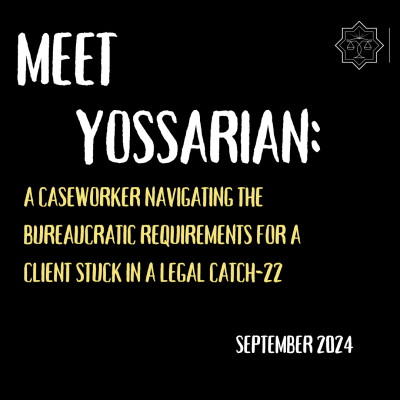Nonsense Of September 2024
This month, to illustrate parts of the administrative kafkaesque nightmare faced by migrants in Greece, we would like to talk about one of the most basic steps and essential rights for any person going through the asylum procedures: representation by a lawyer.
To do so, let us follow Yossarian, a caseworker of Legal Centre Lesvos, who has a simple mission: supporting a client to authorise LCL lawyers to represent him. What should be one of the most basic tasks turns out to be impossible. Let’s dive in.
“They don’t have to show us Catch-22,” the old woman answered. “The law says they don’t have to.”
“What law says they don’t have to?”
“Catch-22.”
This excerpt from Joseph Heller’s novel ‘Catch-22’ comes to my mind when I stand in front of the woman working in the local Citizen’s Service Centre (‘KEP’), a government office that, among other services, verifies the signatures of individuals for authorising legal representation by lawyers.
My client’s application for asylum was rejected two weeks ago and to have a full understanding of what is going on in his case, the lawyers of the LCL need to review his case file. It is a simple task: the client needs to sign a document authorising the lawyer to represent him and act on his behalf. With this authorisation, lawyers can request the case file of their client, which includes all of the documents that the state authorities have regarding the asylum case of that client: initial registration, transcripts of interviews, supporting documents submitted, and any decision. Without the file of their client, lawyers simply cannot work.
To authorise a lawyer to represent you in the asylum procedure, your signature must be certified by a Greek public authority. Now this woman at KEP is telling me she cannot certify the signature of my client because his asylum case has been rejected and he is now outside of the asylum procedure without a valid identification document, in other words with no legal status in Greece.
While I try to explain to her that it is precisely because my client is in this situation that he needs to authorise a lawyer to further support him, I am up against a wall: she keeps repeating that she is not allowed to certify his signature. I tell her that I have been here before with other clients “outside the procedure” and that she certified their signatures. I plead that there is nowhere else we can turn to, to have the certification done. I tell her that their systems have all the necessary information to confirm that my client is who he says he is, and he still has an identification document issued by the Ministry of Migration and Asylum that he uses to access the Closed Controlled Access Centre where he still lives. Nothing works. She keeps repeating that she cannot do it and that she does not know where else we could go to get the signature certified.
This denial of certification is only the latest escalation of making it difficult for migrants to access legal assistance and therefore seek asylum.
Before 2020, a client could simply sign an authorisation with the lawyer of their choice. No need for stamps or certification. Then came 2020, all of a sudden the certified signature procedure was introduced for asylum procedure cases, and required that a public authority certifies people’s signature upon presentation of a valid identification document. Until recently, people who were “outside of the procedure” and had no legal status in Greece could still have their signature certified in the camp by the secretary of the Reception and Identification Centre (RIC) after obtaining their registration papers from the police. A few months ago, however, the secretary of the RIC stopped certifying signatures, even when shown with people’s police papers. Only officials of the KEP can now certify signatures under the requirement of presenting a valid identity document.
Ironically, this new requirement only applies to administrative procedures. In criminal proceedings, lawyers can themselves certify signatures. As such, these additional obstacles apply to asylum procedures in which people are often deprived of valid identity documents by the Greek state itself, because they are foreigners seeking asylum in Greece. The procedure is even more complicated for people who appeal a rejection of their asylum case before administrative courts. In these cases, a certified authorisation from KEP is not enough, and a notarised signature is required, adding not only a practical hurdle – it is extremely challenging to find a notary that agrees to certify the signature of a someone who only has expired documents – but also a financial one – as notarised signatures cost between 30-50 euros.
Importantly, now this problem is not just in this one case of Yossarian’s client. Many other clients of LCL have faced the same issue. Once outside of the procedure, they cannot authorise a lawyer anymore. The Catch-22 is that to attempt to get legal status in Greece after your asylum case has been rejected you need the assistance of a lawyer – a lawyer you can’t get because you can’t authorise anyone to represent you. You become caught in a deadlock with no way out.
Being able to authorise a lawyer to act on your behalf is necessary to access legal assistance and representation: it can in no way be denied to someone based on their legal status or because a person is undocumented. The asylum procedure has so many twists and turns that navigating it without a lawyer is close to impossible, in particular when one receives a negative decision. Denying this right to people is nothing short of illegal and must change immediately.

